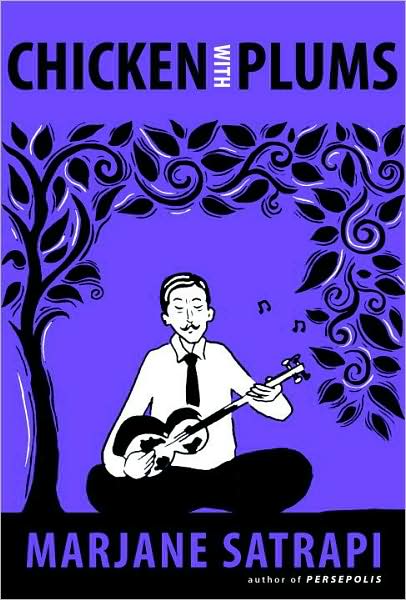Chicken With Plums, by Marjane Satrapi
Jun 23
2009

I do not enjoy tragic love stories. I rolled my eyes when Anna Karenina offed herself, I failed to sympathize with the plight of Newland Archer, and I spent most of The Great Gatsby wanting to kick both Gatsby and Daisy in the shins. It's not that I have no sympathy for real tragedy, but self-inflicted misery leaves me cold—which might be why I couldn't get into Marjane Satrapi's Chicken With Plums, no matter how beautiful the text or intimate the illustrations. (And they are both astoundingly beautiful and deliciously intimate—I am always astonished by how much nuance Satrapi can convey with deceptively simple words and images.)
Chicken With Plums is the story of Nasser Ali Khan, a celebrated musician and Satrapi's great-uncle. Living in late-1950s Tehran, Nasser Ali is unhappily married and disappointed in all but one of his children. When his wife breaks his beloved tar—an Iranian lute—over her knee during an argument and he is unable to find a replacement, Nasser Ali takes to his bed and decides to die. Over the eight days of his decline, Satrapi guides her readers through the primary events of his life (a grim childhood, a love affair gone awry, his mother's death), and shows glimpses of his children's futures.
In the press notes for Chicken With Plums, the story is described as being that of a man who "gave up his life for music and love". While that certainly sounds romantic, it doesn't quite match what I got from the book. Satrapi portrays her great-uncle as a bad spouse, a resentful brother, a biased father, and the kind of man so wrapped up in his own world that he would literally rather die than continue to live surrounded by imperfection. Nasser Ali's story is fascinating and his suicide-though-rapt-self-involvement rings depressingly true, but it is hardly the stuff dreams are made of.
Chicken With Plums is the story of Nasser Ali Khan, a celebrated musician and Satrapi's great-uncle. Living in late-1950s Tehran, Nasser Ali is unhappily married and disappointed in all but one of his children. When his wife breaks his beloved tar—an Iranian lute—over her knee during an argument and he is unable to find a replacement, Nasser Ali takes to his bed and decides to die. Over the eight days of his decline, Satrapi guides her readers through the primary events of his life (a grim childhood, a love affair gone awry, his mother's death), and shows glimpses of his children's futures.
In the press notes for Chicken With Plums, the story is described as being that of a man who "gave up his life for music and love". While that certainly sounds romantic, it doesn't quite match what I got from the book. Satrapi portrays her great-uncle as a bad spouse, a resentful brother, a biased father, and the kind of man so wrapped up in his own world that he would literally rather die than continue to live surrounded by imperfection. Nasser Ali's story is fascinating and his suicide-though-rapt-self-involvement rings depressingly true, but it is hardly the stuff dreams are made of.
Posted by: Julianka
No new comments are allowed on this post.
Comments
No comments yet. Be the first!